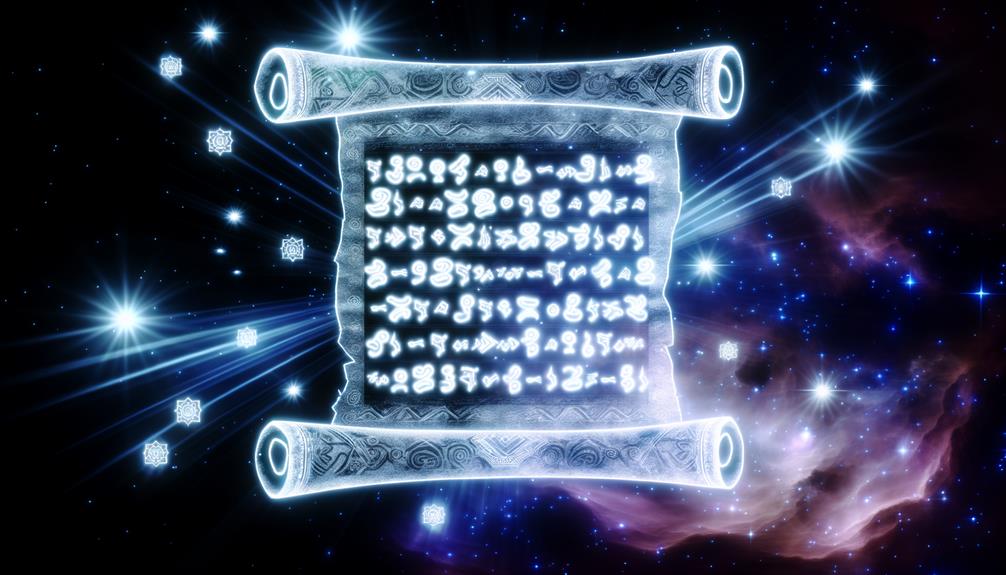123 123 Meaning in the Bible: Spiritual Significance!
In biblical numerology, the sequence 123 123 can be seen as an embodiment of divine order, completeness, and spiritual alignment. The number 1 signifies God’s uniqueness and sovereignty, 2 represents duality and partnership, and 3 symbolizes the Trinity and divine perfection.
The repetition in 123 123 emphasizes the stages of spiritual growth and perseverance in faith. This pattern encourages believers to discern deeper theological meanings and the continuity of divine promises.
Understanding these sequences requires a nuanced analysis of biblical texts and numerical symbolism, suggesting more profound insights lie within the layers of scripture.

Key Takeaways
- The sequence 123 123 symbolizes divine order and completeness, reflecting creation and covenant themes.
- Repetition in the sequence underscores continuity and perseverance in faith.
- The structure invites deeper contemplation of spiritual and theological implications.
- Numerical patterns in biblical texts often convey deeper divine messages beyond literal interpretations.
123 123 in the Bible: Symbolism, Meaning, and Spiritual Interpretation
| Aspect | Explanation |
|---|---|
| Number Pattern | Not directly mentioned in the Bible; considered a symbolic sequence |
| Possible Symbolism | Could represent divine order, growth, or steps toward spiritual completion |
| Biblical Meaning of 1 | Represents God’s unity and sovereignty (Deuteronomy 6:4) |
| Biblical Meaning of 2 | Symbolizes witness and testimony (2 Corinthians 13:1) |
| Biblical Meaning of 3 | Signifies divine perfection and the Trinity (Matthew 28:19) |
Biblical Numerology Overview

Biblical numerology, the study of numbers within the Bible and their theological significance, serves as an essential tool for interpreting scriptural symbolism and divine messages. This analytical approach unravels the layers of meaning embedded within biblical texts, offering deeper insights into the divine narrative.
Numbers such as seven, twelve, and forty recur with notable frequency, each bearing specific theological undertones that reflect spiritual truths and divine principles. For instance, the number seven often symbolizes completeness and perfection, evident in the creation narrative.
Symbolism of Number 1

The number 1 in biblical numerology is often associated with divine leadership, symbolizing God’s singular sovereignty and ultimate authority.
It also signifies unity, reflecting the oneness of God and the harmonious integration of creation under divine order.
Additionally, the number 1 marks new beginnings, representing the inception of creation and the start of significant spiritual journeys.
Divine Leadership Significance
How does the number 1 in biblical numerology symbolize divine leadership and singularity of God’s authority? The number 1 consistently underscores the preeminence and unparalleled sovereignty of God. This numerical symbolism is profoundly anchored in scripture, where God’s singularity and paramount authority are emphasized.
Particularly:
- Genesis 1:1 – The Bible begins with the assertion of God’s unique role in creation.
- Deuteronomy 6:4 – The Shema declares, ‘The Lord our God, the Lord is one,’ affirming monotheism.
- John 1:1 – Establishes Christ as the singular divine expression of God.
- Revelation 1:8 – God declares Himself the ‘Alpha and Omega,’ emphasizing His supreme authority.
These instances collectively underscore the theological importance of the number 1 in illustrating divine leadership and the exclusivity of God’s dominion.
Unity and New Beginnings
In biblical numerology, the number 1 not only signifies divine leadership but also embodies the themes of unity and new beginnings, reflecting the inception of creation and the cohesive nature of God’s plan.
This number is emblematic of a fresh start, seen in Genesis 1:1 with the creation of the world. It underscores the monotheistic principle central to Judeo-Christian belief: the existence of one God.
Additionally, the number 1 denotes spiritual unity, representing the unification of believers under one faith. In the New Covenant, Jesus’ resurrection marks a new beginning for humanity, symbolized by the first day of the week.
Consequently, the number 1 encapsulates the idea of a harmonious beginning, rooted in divine singularity and spiritual integration.
Symbolism of Number 2

Within biblical numerology, the number 2 often symbolizes duality, partnership, and division, encapsulating the concept of balance and unity through differentiation. This number reflects the fundamental dualities present in the Bible, emphasizing the importance of relationships and interdependence.
For instance:
- Creation of Eve: God created Eve from Adam’s rib, establishing the first partnership.
- Old and New Covenants: The Bible itself is divided into two significant sections, reflecting continuity and contrast.
- Witnessing: According to Deuteronomy 19:15, a matter is established by the testimony of two or three witnesses, underscoring the importance of corroboration.
- Good and Evil: The constant biblical theme of moral dichotomy, symbolizing the struggle and balance between righteous and sinful paths.
These examples illustrate how the number 2 encapsulates foundational biblical principles.
Symbolism of Number 3

The number 3 holds significant theological and symbolic importance in the Bible, often representing the Trinity and the divine presence of God as Father, Son, and Holy Spirit.
This number is also closely associated with the themes of resurrection and new beginnings, most importantly exemplified in the resurrection of Jesus Christ on the third day.
Additionally, number 3 frequently symbolizes completeness and wholeness, underscoring its integral role in biblical narratives and teachings.
Trinity and Divine Presence
Exploring the symbolism of the number 3 in the Bible reveals profound theological implications, particularly in relation to the concept of the Trinity and the manifestation of divine presence.
The number 3 encapsulates the essence of the Triune God—Father, Son, and Holy Spirit—each distinct yet unified in divine essence. This tripartite structure is not merely numerical but profoundly theological, signifying completeness and perfection. The divine presence is often illustrated through triple occurrences, enhancing their sacredness.
Consider these compelling instances:
- The threefold blessing in Numbers 6:24-26 evokes divine favor.
- Jesus’ resurrection on the third day signifies divine victory.
- Peter’s three denials and subsequent affirmations illustrate redemption.
- The thrice-holy proclamation in Isaiah 6:3 underscores God’s holiness.
These examples highlight the theological depth of the number 3.
Resurrection and New Beginnings
Signifying themes of resurrection and new beginnings, the number 3 in the Bible often marks pivotal moments of transformation and renewal.
Symbolically, the number 3 is integrally linked to the resurrection of Jesus Christ, who rose on the third day, epitomizing the ultimate renewal of life.
Additionally, Jonah’s three days in the belly of the great fish prefigures this theme of deliverance and new beginnings.
The Apostle Peter’s thrice-repeated denial and subsequent threefold affirmation of love for Jesus underscore a transformative journey from failure to restoration.
Hence, the recurring motif of the number 3 serves as a theological and narrative instrument, encapsulating the profound dynamics of death, rebirth, and spiritual regeneration in biblical literature.
Completeness and Wholeness
Building on the transformative themes of resurrection and new beginnings, the number 3 in the Bible also connotes completeness and wholeness, reflecting a state of divinely ordained perfection and unity. This numerical symbolism is evident in various biblical instances:
- The Holy Trinity: Representing the Father, Son, and Holy Spirit, encapsulating divine wholeness.
- Jesus’ Resurrection: Occurring on the third day, symbolizing victory over death and ultimate completeness.
- Threefold Benediction: Found in Numbers 6:24-26, illustrating divine blessing in its fullness.
- Jonah’s Three Days: In the belly of the great fish, signifying a complete period of transformation.
These instances illustrate how the number 3 weaves a narrative of totality and divine perfection throughout the biblical text.
Repetition in Scripture

The repetition of numbers and phrases in scripture often serves as a significant literary and theological device, emphasizing particular themes and messages.
For instance, the number seven frequently appears, symbolizing completeness and divine perfection, as seen in the creation narrative of Genesis. Similarly, phrases like ‘Truly, truly, I say to you’ in the Gospels underscore the importance of the ensuing statements.
Such repetition not only reinforces key ideas but also aids in the memorization and oral transmission of biblical texts. Additionally, prophetic literature employs repetition to highlight urgency and divine authority.
Understanding these patterns provides deeper insight into the text’s structure and intention, allowing readers to grasp the underlying theological implications more fully.
Spiritual Growth Insights

Examining the repetition of numbers and phrases in Scripture leads us to valuable insights into the theme of spiritual growth, as these elements often signify stages of development and maturation in the believer’s journey.
The significance of these repetitions can be understood through various dimensions:
- Transformation: Repeated symbols often mark moments of profound change, highlighting the believer’s evolving relationship with the divine.
- Perseverance: Persistent motifs underscore the importance of steadfastness and resilience in faith, even amidst trials.
- Guidance: Consistent themes serve as a divine roadmap, directing believers towards spiritual enlightenment and deeper understanding.
- Fulfillment: Recurrent elements often culminate in a sense of completion, reflecting the realization of God’s promises and the believer’s spiritual goals.
Divine Messages Decoded

Interpreting the numerical patterns in the Bible requires a nuanced understanding of their theological, historical, and cultural contexts. Biblical numerology often conveys divine messages that transcend literal interpretations.
For instance, the number seven frequently symbolizes completeness, as seen in the seven days of Creation. Such patterns are not mere coincidences but deliberate, imbued with profound significance.
Scholars analyze these elements meticulously, considering the original Hebrew and Greek texts and their cultural implications. By decoding these numerical messages, one can uncover deeper layers of meaning, enhancing the comprehension of biblical teachings.
This endeavor demands rigorous scholarship and a deep appreciation for the intricate tapestry of biblical literature, revealing the divine wisdom encoded within its sacred texts.
Scriptural Patterns and Numbers

Scholars often identify recurring numerical motifs within the Bible, each serving as a key to revealing deeper theological insights. These patterns are not arbitrary but are imbued with symbolic significance that beckons deeper contemplation.
For instance:
- The number 7: Often represents completeness or divine perfection, as seen in the seven days of Creation.
- The number 12: Symbolizes divine governance, particularly in the twelve tribes of Israel and twelve apostles.
- The number 40: Signifies periods of testing or judgment, exemplified by the 40 days of rain during the Flood and Jesus’ 40 days in the wilderness.
- The number 3: Frequently associated with divine wholeness, evident in the Holy Trinity and Jonah’s three days in the fish.
These numeric patterns serve not merely as literary devices but as profound theological constructs inviting meticulous study.
Applying 123 123 Today

Building upon the rich tapestry of numerical symbolism in the Bible, the contemporary exploration of the number 123 123 invites modern readers to discern its potential spiritual and theological implications in today’s context.
This specific sequence, though not explicitly mentioned in Scripture, encourages a nuanced examination of numerical patterns and their resonance within biblical texts.
Scholars might consider the repetitive nature of 123 123 as a reflection of divine order and completeness, drawing connections to scriptural themes of creation, covenant, and redemption.
The sequence’s repetitive structure could also symbolize continuity and perseverance in faith.
Conclusion
In juxtaposing the individual and collective symbolism of numbers 1, 2, and 3, a profound spiritual narrative emerges within biblical numerology.
The repetition of 123 underscores themes of divine order, unity, and spiritual progression. This pattern, seen throughout Scripture, offers insights into divine messages and spiritual growth. Furthermore, the repetition of 123 can be interpreted as a representation of the biblical significance of the number 108, which symbolizes completeness and wholeness in the Christian faith. In this way, the pattern serves as a reminder of God’s perfect and orderly design for the world and our journey towards spiritual fulfillment. By recognizing and reflecting on the significance of these numerical patterns, individuals can gain a deeper understanding of their faith and a greater appreciation for the divine messages found within Scripture.
By understanding these numerical codes, one can discern deeper theological meanings and apply these timeless principles to contemporary faith practices, thereby bridging ancient wisdom with modern spiritual understanding.






